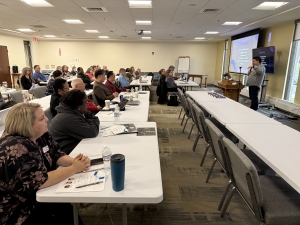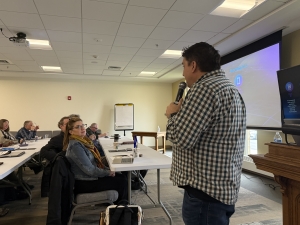news article
Exploring AI in Ministry: Training with Jason Moore
November 7, 2025 / By UNY Communications / .(JavaScript must be enabled to view this email address)
 Pastors, church leaders, and Upper New York Conference staff came together on Wednesday, November 5, at the United Methodist Center to explore how artificial intelligence (AI) can enhance and support ministry.
Pastors, church leaders, and Upper New York Conference staff came together on Wednesday, November 5, at the United Methodist Center to explore how artificial intelligence (AI) can enhance and support ministry.
Nationally recognized digital ministry expert Jason Moore led the training, explaining the fundamentals of AI, demonstrating its potential benefits in planning and ministry work, exploring different forms of AI, and reflecting on the ethical and spiritual discernment needed to use this emerging technology faithfully. The training was hosted by Missional Excellence’s Innovation Initiative, led by the Rev. Abigail Browka, who emphasized the church’s commitment to staying current as a driving force behind the session.
“Jason’s approachable teaching helps us as Church Leaders help people navigate with wisdom and grace as AI becomes an unavoidable part of daily life,” stated Rev. Browka. “Use AI not to replace inspiration, but to support the work you’ve already created through reflection and the Holy Spirit.”
Using AI Already
Moore explained that many people are already using AI without realizing it. Unlocking a smartphone with facial recognition, receiving suggestions from streaming platforms like Netflix or Amazon, using voice assistants such as Alexa, Siri, or Cortana, and navigating with GPS or search engines—all rely on AI. “AI is a silent partner in life and has helped you get to places faster, find things quicker, schedule things easier, and more,” Moore noted.
Yet despite its prevalence, AI remains the latest technology many are hesitant or even opposed to using. “We have a history in the Church of not taking advantage of the latest technology that's available to us,” he said. “When Gutenberg invented the press, there was resistance. Many felt manuscripts and writing by hand were the most holy way to pass on knowledge. Radio came around, and the Church was resistant. Then television. Then the Internet—and for some of us, the only reason we’re online now is because something called COVID showed up. Embrace technology but exercise restraint in using it.”
Attitudes Surrounding AI
 In his book AI and the Church, Moore identifies three types of people when it comes to AI: the curious, the convinced, and the skeptical. The curious are seeking to understand but lack knowledge. The convinced believe they should use AI, have some familiarity, and want to leverage it more effectively and responsibly. The skeptics see AI as dangerous or negative but may be encouraged to consider its potential.
In his book AI and the Church, Moore identifies three types of people when it comes to AI: the curious, the convinced, and the skeptical. The curious are seeking to understand but lack knowledge. The convinced believe they should use AI, have some familiarity, and want to leverage it more effectively and responsibly. The skeptics see AI as dangerous or negative but may be encouraged to consider its potential.
In attendance was the Rev. Raquel Alston, Pastor at Buffalo: Central Park UMC. “What stayed with me from the workshop was that A.I. isn’t about replacing people—it’s about partnering with us,” She stated. “I now see it as a bridge that helps us share God’s love in fresh, creative ways. When we use it with intention and care, it doesn’t take away our humanity; it helps us lean into it.”
“We are living in a future that was predicted in the past,” Moore explained, referencing talking cars in the 1980s show Knight Rider, robots in the 1960s cartoon The Jetsons, and the droids of the Star Wars franchise.
Biblical Foundations
Moore grounded the conversation in Scripture, highlighting biblical and Wesleyan foundations for faithful engagement with technology. From Genesis, he noted that God’s command to “be fruitful and have dominion” invites humanity to create and steward responsibly—reminding participants that AI is a tool, not a living being, and its impact depends on how it’s used.
Glenn Harrison, Pastor at Rock City Falls: Simpson UMC also attended Exploring AI in Ministry. “We discovered how artificial intelligence can become a creative companion in sharing the message of Jesus,” he explained. “Through AI, we can craft stories, visuals, suggestive hymns, and messages that bring Scripture to life in ways never before possible. Though creating these worship resources requires time, care, and investment, the impact is eternal. The key is not to let AI lead your message, but to guide it with prayerful intention—asking precise questions that help your final work reflect truth and the heart of the Gospel. Jason shared how AI is just another tool in our toolbox.”
 Drawing from Exodus, he cited Bezalel, the artisan filled with God’s Spirit to create, as a reminder that human creativity—including coding and technological innovation—is a divine gift. He also connected the idea of the “great cloud of witnesses” to AI, showing how it can surface wisdom from generations of theologians to expand understanding, not replace discernment.
Drawing from Exodus, he cited Bezalel, the artisan filled with God’s Spirit to create, as a reminder that human creativity—including coding and technological innovation—is a divine gift. He also connected the idea of the “great cloud of witnesses” to AI, showing how it can surface wisdom from generations of theologians to expand understanding, not replace discernment.
Building on this foundation, Moore introduced a Wesleyan ethical framework for appropriate AI use in ministry: do no harm, do good, and stay in love with God. To “do no harm,” he cautioned against uncritical reliance on AI, which can depersonalize ministry or reinforce bias. While AI can assist—such as suggesting hymns or generating ideas—it cannot replace the human creativity and contextual sensitivity of pastors, musicians, or artists. To “do good,” Moore encouraged churches to use AI to expand inclusion and equity, from translating materials to diversifying imagery that better reflects God’s people. Finally, to “stay in love with God,” he warned of the danger of substituting AI for the Holy Spirit, sharing a personal story of feeling briefly lost when his ChatGPT history disappeared—a moment that reminded him to rely first on prayer and spiritual grounding. He emphasized that AI should be used only after engaging Scripture and prayer, as a supplemental tool that supports, rather than replaces, Spirit-led discernment.
Downside of AI
While AI offers exciting possibilities, Moore cautioned that it also carries significant risks. He stressed the importance of trust but verify: AI can “hallucinate,” producing false or fabricated information, including fictional scripture references or legal citations. Bias is another concern—AI often reflects assumptions embedded in its training data, so prompts should be intentionally inclusive to avoid reinforcing stereotypes, particularly in images or religious representations. Intellectual property and plagiarism present further challenges, as AI may replicate widely shared knowledge or copyrighted material without proper attribution. Additionally, personalized AI-generated media and deepfakes demonstrate AI’s ability to manipulate images, voices, and video, raising security and ethical concerns.
Moore urged ministry leaders to use AI deliberately, ensuring it supplements rather than replaces human discernment, while teaching congregations to critically evaluate outputs, maintain ethical boundaries, and safeguard trust, truth, and security in all applications.
Future Trainings
The Upper New York Conference is hosting three webinar trainings with Moore with registration information to be shared soon:
- AI 101: January 12 from 7-8:30 p.m.
- Sermon Design with AI Support: February 10 from 7-8:30 p.m.
- AI 101: March 9 from 7-8:30 p.m.